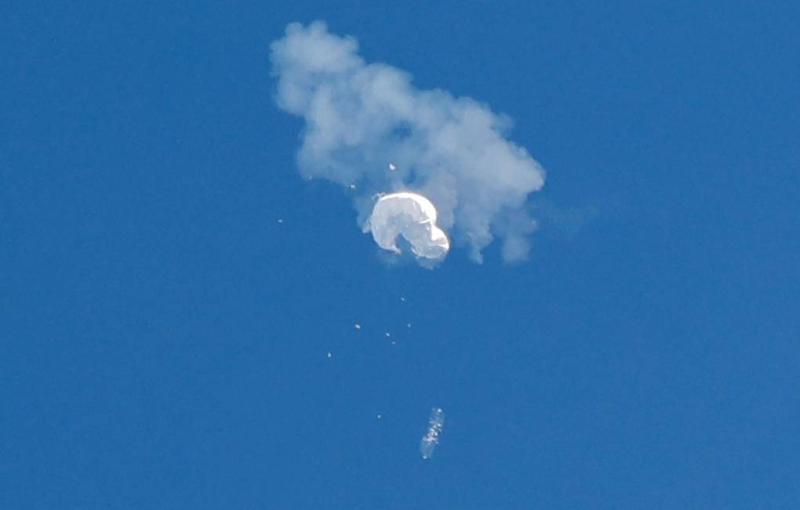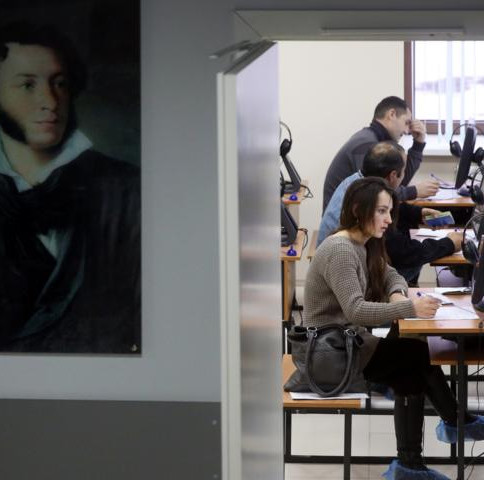
© REUTERS/Randall Hill/TASS
Top stories from the Russian press on Monday, February 6th, prepared by TASS
The Chinese balloon muddied relations between Washington and Beijing, experts assessed the possible consequences for Europe in the wake of a price ceiling on Russian oil, while the United States is weighing deploying hypersonic weapons and medium-range missiles in Japan. These stories dominated Monday’s newspaper headlines across Russia.
Media: Balloon mars US-China relations
On Saturday, the United States downed what Washington said was a Chinese spy balloon that had been flying over America for a few days. According to Beijing, it was a weather balloon that deviated from its intended path. The story jeopardized the already rocky relations between the two countries: experts say the incident comes at a time when Washington and Beijing were about to resume dialogue that could become a step toward normalization.
The balloon was destroyed on US President Joe Biden’s instructions on February 4, according to a report by Defense Secretary Lloyd Austin. The Chinese Foreign Ministry protested the move. However, the first consequences for bilateral relations between Washington and Beijing occurred while the balloon was still in the air, as US Secretary of State Antony Blinken canceled his scheduled visit to China.
To senior Chinese researcher at the Carnegie Moscow Center Alexander Gabuyev, it is the timing, not the incident itself, that matters most. At the G20 summit in November, Biden and Chinese leader Xi Jinping attempted to lay the groundwork for stable bilateral relations for the next two years of Biden’s presidency, as the entire 2022 was a year filled with difficulties, the expert told Kommersant. China’s stance on Russia has been an important, albeit temporary, irritant, given the importance of Ukraine for US foreign policy. Among other irritants are Nancy Pelosi’s visit to Taiwan, and export controls the US imposed on the bulk of Chinese companies last October. So, Blinken’s visit was to outline a certain plan for restoring dialogue, but that will not happen now, and communication may be frozen for quite a long time, Gabuyev fears.
Program Coordinator at the Russian International Affairs Council Konstantin Sukhoverkhov disagrees. The expert told Izvestia that the situation around Blinken’s visit will not have a global impact on relations between Washington and Beijing because the Secretary of State's trip has not been canceled but only postponed indefinitely. According to him, China and the United States will continue bilateral dialogue, and the two sides will try to smooth things over, as nobody needs confrontation now, particularly the US, as it prioritizes the European direction amid the conflict in Ukraine. Sukhoverkhov sees lots of potential causes for an escalation between China and the US - from military-political to economic ones, and yet the two economies are so intertwined that any conflict would not benefit either Beijing, or Washington, the expert emphasizes.
Izvestia: What awaits Europe in wake of price ceiling on Russian oil
Petroleum products may rise in cost by 20-30% in the next few months, now that the European Union has agreed on a price ceiling for Russian petroleum products, financial analyst at BitRiver Vladislav Antonov told Izvestia. Previously, Europe bought petroleum products from Russia directly, but now it will have to do so via oil refineries in India, China and other countries. The increase in logistical constraints will significantly affect the prices, the expert argues.
On Friday, the EU set the maximum price for premium-to-crude products at $100 per barrel and the maximum price for discount-to-crude products at $45 per barrel. From now on, Europe will not only be forced to buy petroleum products from resellers at a higher price, but may face a deficit in diesel as motor fuel, as well as naphtha as a material for oil refining and liquefied petroleum gas (LPG), warns Dmitry Gusev, Deputy Chairman of the Reliable Partner association that brings together energy producers and sellers. "Given European industries have shrunk amid the energy crisis and amid a relatively minor risk of oil deficit, LPG supplies will likely come from the United States, while diesel and naphtha imports from India and China will cause a spike in prices and pose shortage risks," Gusev said.
Meanwhile, some experts expect that fuel prices in Russia may stop growing amid the latest sanctions. At least, Head of the Center for Analysis of Strategy and Technologies for the Development of the Fuel and Energy Complex at the Gubkin Russian State University of Oil and Gas Vyacheslav Mishchenko suggested this on Friday. The fact is that the restrictions on Russia’s oil and gas industry and primarily on oil refining should lead to an increase in the amount of fuel domestically.
However, Russia may find it difficult to redirect its petroleum products to the Asia-Pacific region quickly, while its new partners may demand an extra discount, Antonov said. In February, exporters will be busy establishing new supply chains to Asian-Pacific economies and adjusting to new conditions under the sanctions, which may cause a decline in Russian exports, he added.
Vedomosti: US suggests deploying hypersonic weapons, cruise missiles in Japan
The United States may deploy Tomahawk cruise missiles which have a range of about 2,000 km and LRHW hypersonic systems in Japan, Sankei Shimbun reported. The latter will be able to hit targets almost 2,800 km away. Authorities in Japan are ready to start serious discussions on a deployment plan, officials told the Japanese newspaper which said the move may be aimed at striking a strategic balance between Washington and Tokyo in Eastern Asia and preventing any use of force by China.
The US has been mulling deploying its missiles in the Asia-Pacific region to counterbalance Chinese forces for more than a decade now, and Washington exited the INF Treaty exactly for this reason, says Director of the Center for Comprehensive European and International Studies at the Higher School of Economics Vasily Kashin. There came a time when it became clear to the Americans that any surface warships that can be deployed in the Western Pacific are vulnerable for attacks, while the capacity of their launchers is less than those in service with Chinese missile brigades. According to Kashin, the conflict in Ukraine showed that it is almost impossible to track ground-based missiles in time, and therefore they are likelier to survive an initial attack from China. Any deployment of the above-mentioned missile systems in either the Kyushu or Ryukyu Islands will not be a major gamechanger for Russia, while Moscow will have to respond if similar weapons are deployed in Hokkaido, for such a scenario would threaten Russian submarines near Kamchatka and its troops in the Kuril Islands and Sakhalin, the expert warned.
Oleg Paramonov, senior researcher at the Center of East Asian Studies and SCO of MGIMO, agrees that the deployment of US medium-range missiles in Kyushu would likely be the first step. Japan’s agreement to any such deployment would mean a further escalation of the missile race in the Asia-Pacific, Paramonov told Vedomosti. As a result, the Japan-US alliance will gradually transform from a defensive one into a military-political construction with significant offensive potential, the expert emphasized.
Izvestia: Russian politicians uncover who participated in US biolab programs in Ukraine
The personal data of Pentagon experts who played a role in biomedical programs on Ukrainian soil have been established, Duma Deputy Speaker Irina Yarovaya, who also co-chairs a parliamentary commission looking into biolabs, told Izvestia. According to her, politicians identified the Pentagon’s contractors, by comparing the latest report by the Defense Threat Reduction Agency (DTRA) with "documents unearthed by the commission."
At present, parliamentarians are getting ready for another meeting on the investigation of US biolabs in Ukraine to be held at the State Duma with the participation of Russian Defense and Interior ministries later on Monday. Among other topics, the meeting will discuss the DTRA’s latest report, Yarovaya said.
Lawmakers and senators intend to interrogate more witnesses and involve new people in the probe. The commission has already sent invitations to Ken Myers, former director of the DTRA, Professor Jeffrey Sachs, who heads The Lancet’s commission on COVID-19, and another US expert, Dr. Andrew Huff, who previously claimed that the coronavirus had been artificially developed at the US’ request.
"Consultations via diplomatic channels are currently underway. We hope that world-renowned researchers will soon respond to our invitation and that a substantive discussion will take place at the next meeting," Yarovaya said.
The director of the Military-Political Studies Center at the institute of international relations MGIMO, Aleksey Podberyozkin, said that a report analyzing the consequences of the activity of such biolabs to be prepared by the parliamentary commission would be submitted to Russian President Vladimir Putin and made public globally.
Vedomosti: Platts launches new Urals quote
Late in January, S&P Global Platts introduced a price quote for the Russian Urals blend that reflects its costs in Indian ports. A source told Vedomosti that the new Platts Urals quote takes into account the price of oil, cargo insurance and freight, which makes it "more representative" than the existing benchmarks for Russian oil by Argus. The price index provider whose data was previously used by the Russian Finance Ministry for forecasting the country’s oil and gas budget revenues left Russia in March 2022.
Another source told the newspaper that Platts uses a link to Brent forwards in its calculations, that is, if a delivery took place on February 3, the parties must wait until the end of the month to calculate the average oil price for February. However, Platts is using a new benchmark, so it’s unclear whether that is as representative, the source said.
Chief Economist at PF Capital Yevgeny Nadorshin believes that neither the new quote from Platts, nor the one that used to be provided by Argus is ideal. The cost of Urals in Indian ports may include additional costs due to the lengthy logistical leverage, crew premiums, etc., he argues. Traders themselves who submit data to the pricing agency may cause price distortions, too, Nadorshin warns.
Vedomosti sent inquiries to Platts, the Finance Ministry and the Economic Development Ministry.









